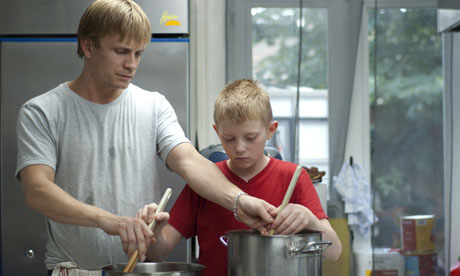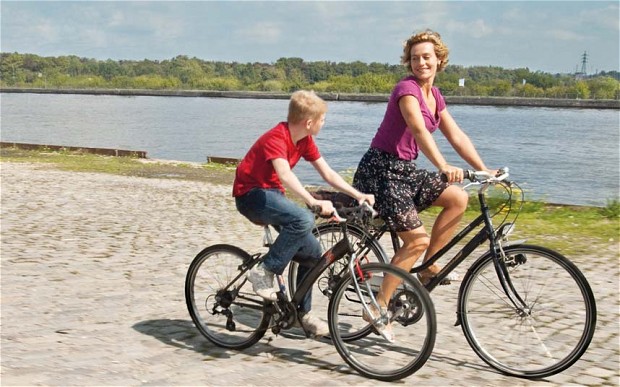|
Cyril
(Thomas Doret)
is a wilful child who is left terrified in a children’s home after
realising
that his father has dropped out of contact. He uses every trick he can
in order
to navigate his way back to his father’s unit. In one attempt, he gets
as far
as the door but has to flee to a nearby medical centre in order to lose
his
trailing caretakers. Inside, he tenaciously clings on to a female
hairdresser seated
in the waiting room, Samantha (Cecile
de France), and refuses to release her. He tells his caretakers and the
building’s janitor that his bike is inside his father’s unit and so
they allow
him inside. It is empty. Samantha later visits him at the home to gift
him his
bicycle, having paid off a kid in the neighbourhood for it. Cyril
suspects that
the bike was stolen, trusting that his father would never have sold it.
Samantha
and Cyril form an unanticipated bond and together track his father’s
whereabouts. Their search leads them to a small café where he recently
gained employment.
Guy (Jeremie Renier), his father, confesses to Cyril that he did sell
the bike
as he was short on cash and that he never wants to see him again. These
traumatic
revelations send Cyril into a tailspin that causes him to violently
lash out against
the only person who loves him, consort with a local gang and commit a
shocking crime:
each to their own unforeseeable consequences.

“Le Gamin
au Velo”
(“The Kid with a Bike”), the latest effort from the Dardennes brothers,
arrives
on our shores having already received the prestigious Grand Prix prize
at the
2011 Cannes Film Festival. Jean-Pierre and Luc are directors of the
highest
order, having previously been awarded the Palme D’Or twice for
“Rosetta” (1999)
and “The Child” (2005). Unfortunately, in this particular tale, the
emotional
complexity and narrative verve that have so often set their movies
apart from those
of their contemporaries are found desperately wanting. The movie marks
out a subtle
modification of the Dardennes’ established aesthetic as it retains
their hard-luck protagonists, unhurried pacing and
familial
tropes whilst experimenting with a popular actress and a few timely
sonic interventions.
These tweaks are understandable and even praiseworthy but they
ultimately deprive
the film of the sort of realism that previously made their films so
impactful.
Luc
stated in an
interview that the idea of a narrative in which “a woman who helps a
boy emerge
from the violence that holds him prisoner” had been gestating over an
extensive
period within both his and his brother’s minds. He further discussed
their
unexpected use of music remarking, “it is very rare in our films and we
hesitated for a long time. In a fairytale there has to be a
development, with
emotions and new beginnings. It seemed to us that music, at certain
points, could
act like a calming caress for Cyril”. His implicit admission about the
film’s fairytale
influence is surprising. In hindsight, the movie’s title (the bike
symbolising
youthful restlessness and reckless danger), the presence of an angelic
figure
and the boy’s childhood journey do hint at its inspirations but this
influence
is not communicated clearly enough to be effective. The undoubted star
in this production
is Thomas Doret. His acting, though not as prodigious as Yuya Yagira’s
in
Hirokazu Kore-Eda’s “Nobody Knows” or David Bradley’s in Ken Loach’s
“Kes”, does
convey masked vulnerability, cynical guile and the male need for
paternal
affection with aplomb. The aspect that will polarise opinion the most
is the spellbinding
climax in which Cyril’s life is placed in a state of mortal danger. It
is a
moment of stilled chaos wherein the possibility of hope in its
realistically cold
world hangs on by a thread. Some will argue that it represents a moment
of inspired
magic. I felt it to be irresolute and forced.

A helpful
way to
perceive the film is to screen it through the unconvincing claim of one
particular
critic who praised it as the best film on childhood since “Kes” and
“Bicycle
Thieves”. “Kes” images a tender, elegiac tale about a boy’s initiation
into the
insensitive world around him. “Bicycle Thieves” subjects a family’s
tragic
story to the harsh glare of the Italian neo-realist lens. Both these
films are
decided masterpieces. “The Kid with a Bike”, however, is only a decent
film
that establishes an emotional register that is as empty as Guy’s former
unit. This detachment paralyses its
potential. Any praise that the film might have derived from its attempt
at
unsentimental, true-to-life realism is undercut by its combination of
extradiegetic
sound, unconvincing events and absurd resolution. It refuses to amplify
the
strong empathetic impulses that a fairytale would ordinarily register
and its
fairytale trappings curtail any serious aspirations to realism that it
might have
had. The movie subtly contradicts itself. This does not turn the film
into an
irredeemable disaster but it does relegate it to
that of
a lesser Dardennes’ feature.
|